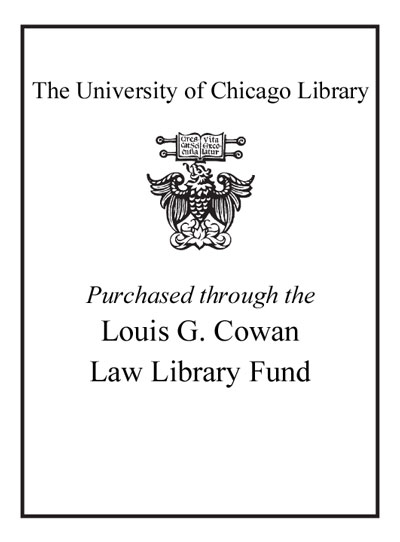Impediments to exercising jurisdiction over international crimes /
Saved in:
| Author / Creator: | Naqvi, Yasmin. |
|---|---|
| Imprint: | The Hague : T.M.C. Asser Press, c2010. |
| Description: | xviii, 418 p. ; 25 cm. |
| Language: | English |
| Subject: | |
| Format: | Print Book |
| URL for this record: | http://pi.lib.uchicago.edu/1001/cat/bib/8058139 |
Table of Contents:
- Foreword
- Acknowledgements
- Abbreviations
- Part 1. Exercising Jurisdiction over International Crimes
- Chapter 1. Introduction
- 1.1. Impediments to exercising jurisdiction over international crimes
- 1.2. Impediments
- 1.3. Jurisdiction
- 1.4. International crimes
- 1.4.1. War crimes
- 1.4.1.1. Grave breaches
- 1.4.1.2. Serious violations of the laws and customs of war
- 1.4.2. Crimes against humanity
- 1.4.3. Genocide
- 1.4.4. Torture
- Part 2. Impediments
- Chapter 2. Amnesties
- 2.1. Definition and historical context
- 2.2. Amnesties and international and hybrid criminal courts and tribunals
- 2.3. Contextual and policy considerations
- 2.3.1. The need to secure the peace and maintain the peace
- 2.3.2. The need for a public accounting of the truth
- 2.3.3. The need to strengthen the rule of law and uphold the principle of legality
- 2.3.4. The question of deterrence
- 2.3.5. The need for reconciliation
- 2.4. Legal rationales with regard to the exercise of jurisdiction in the face of amnesties
- 2.4.1. The scope of the obligation to prosecute international crimes
- 2.4.2. Whether victims' fundamental rights vitiate the validity of amnesty laws
- 2.4.3. Whether States are constrained not to amnesty international crimes due to the peremptory character of international crimes
- 2.5. Preliminary conclusions
- Chapter 3. Pardons
- 3.1. Definition and historical background
- 3.2. Pardons and international and hybrid criminal courts and tribunals
- 3.3. Contextual and policy considerations
- 3.4. Legal rationales with regard to the use of pardons covering international crimes
- 3.4.1. The scope of the obligation to punish those convicted of international crimes
- 3.4.2. The possibility of pardons or commutation of sentence by international criminal courts
- 3.4.3. Clemency by way of the guilty plea
- 3.4.4. The possible ne bis in idem effect of pardon
- 3.5. Preliminary conclusions
- Chapter 4. Statutes of Limitation
- 4.1. Definition and historical background
- 4.2. Statutes of limitation and international and hybrid criminal courts and tribunals
- 4.3. Contextual and policy considerations
- 4.4. Legal rationales with regard to statutes of limitation covering international crimes
- 4.4.1. International customary law precludes the use of statutes of limitation over international crimes
- 4.4.2. Obligations to prosecute international crimes or to ensure fundamental human rights are incompatible with statutes of limitation
- 4.4.3. The purposes and principles underlying the use of statutes of limitation do not account for the specificities of cases dealing with international crimes
- 4.4.4. Time may be tolled in many cases where international crimes have been committed
- 4.5. Preliminary conclusions
- Chapter 5. Immunities
- 5.1. Definition and historical background
- 5.1.1. Functional immunity
- 5.1.2. Act of State doctrine
- 5.1.3. Personal immunity
- 5.1.3.1. Diplomatic immunity
- 5.1.3.2. Head of State Immunity
- 5.1.3.3. Head of government and foreign minister immunity
- 5.1.4. State immunity
- 5.1.5. National immunity
- 5.2. Immunities and international and hybrid criminal courts and tribunals
- 5.3. Contextual and policy considerations
- 5.3.1. Functional immunity
- 5.3.2. Act of State doctrine
- 5.3.3. Personal immunity
- 5.3.3.1. Diplomatic immunity
- 5.3.3.2. Head of State immunity
- 5.3.3.3. Head of Government and Foreign Minister immunity
- 5.3.4. State immunity
- 5.3.5. National immunity
- 5.4. Legal rationales with regard to functional and personal immunities for international crimes
- 5.4.1. Treaty obligations to prosecute or extradite persons accused of international crimes are incompatible with immunities
- 5.4.2. States have impliedly waived immunity of their officials by signing treaties criminalising certain international offences
- 5.4.3. Customary international law lifts functional (and personal) immunity in case of international crimes
- 5.4.4. The jus cogens nature of international crimes overrides immunity
- 5.4.5. International crimes fall outside of the notion of 'acts performed in a sovereign capacity'
- 5.4.6. The fundamental rights of victims are incompatible with fundamental human rights
- 5.5. Preliminary conclusions
- Chapter 6. The Principle of Ne Bis in Idem
- 6.1. Definition and historical background
- 6.1.10. Historical background
- 6.1.2. Ne bis in idem and international and hybrid criminal courts and tribunals
- 6.1.3. Definition
- 6.1.3.1. What constitutes an 'idem'
- 6.1.3.2. Types of procedures to which ne bis in idem may attach
- 6.2. Contextual and policy considerations
- 6.3. Legal rationales with regard to the principle of ne bis in idem and international crimes
- 6.3.1. Legal arguments countering a transnational ne bis in idem principle
- 6.3.2. Fundamental defects in the trial/Sham trial
- 6.3.3. Retrial in the case of newly discovered evidence or facts
- 6.3.4. The State claim to exercise jurisdiction over offences committed on its territory
- 6.3.5. Exception for certain offences
- 6.3.6. Additional serious offences
- 6.4. Preliminary conclusions
- Chapter 7. Abuse of Process
- 7.1. Definition and historical background
- 7.2. Contextual and policy considerations
- 7.2.1. The need to ensure a fair trial
- 7.2.2. The need to preserve the integrity of the judicial system
- 7.3. Legal rationales with regard to the doctrine of abuse of process and international crimes
- 7.3.1. Abduction/Disguised extradition
- 7.3.1.1. National level
- 7.3.1.2. International level
- 7.3.2. Procedural rights
- 7.3.2.1. National level
- 7.3.2.2. International level
- 7.3.3. Delay
- 7.3.3.1. National level
- 7.3.3.2. International level
- 7.3.4. Withholding of exculpatory evidence
- 7.3.5. Double jeopardy
- 7.3.6. Breach of promises of non-prosecution (amnesty)
- 7.3.6.1. National level
- 7.3.6.2. International level
- 7.3.7. Misuse of the criminal process
- 7.4. Preliminary conclusions
- Part 3. General Conclusion
- Chapter 8. General Conclusion
- Bibliography
- Table of Cases
- Index

